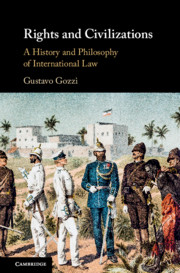Book contents
- Rights and Civilizations
- Rights and Civilizations
- Copyright page
- Dedication
- Contents
- Preface to This English Translation
- Introduction: The West and the Law of Peoples
- Acknowledgments
- A Note on the Contents
- Part I Ius Gentium and the Origins of International Law
- Part II International Law and Western Civilization
- 5 International Law and Western Civilization
- 6 International Law, Peace, and Justice: Hans Kelsen’s Normativism
- 7 Realist Perspectives: Historiography, International Law, International Relations
- 8 Order and Anarchy: The Grotian Tradition
- Part III International Law, Islam, and the Third World
- Part IV Conditions for Peace
- Glossary of Arab Terms
- Index
6 - International Law, Peace, and Justice: Hans Kelsen’s Normativism
from Part II - International Law and Western Civilization
Published online by Cambridge University Press: 11 February 2019
- Rights and Civilizations
- Rights and Civilizations
- Copyright page
- Dedication
- Contents
- Preface to This English Translation
- Introduction: The West and the Law of Peoples
- Acknowledgments
- A Note on the Contents
- Part I Ius Gentium and the Origins of International Law
- Part II International Law and Western Civilization
- 5 International Law and Western Civilization
- 6 International Law, Peace, and Justice: Hans Kelsen’s Normativism
- 7 Realist Perspectives: Historiography, International Law, International Relations
- 8 Order and Anarchy: The Grotian Tradition
- Part III International Law, Islam, and the Third World
- Part IV Conditions for Peace
- Glossary of Arab Terms
- Index
Summary
- Type
- Chapter
- Information
- Rights and CivilizationsA History and Philosophy of International Law, pp. 141 - 165Publisher: Cambridge University PressPrint publication year: 2019

